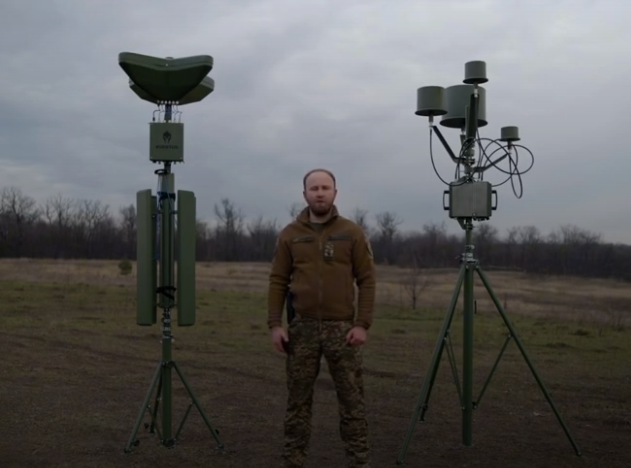
Kvertus, a Ukrainian developer and manufacturer of anti-drone systems for military use, has launched ‘Atlas‘, a £103.7M project to create an advanced anti-drone ‘wall’ to span the frontline, using its electronic warfare (EW) technologies. Supported and backed by the Ukrainian Armed Forces, the project will utilise EW and electronic reconnaissance (ER) technologies to save the lives of countless soldiers and civilians while protecting critical infrastructure from the escalating threat of unmanned aerial vehicles (UAVs).
As the war in Ukraine enters another year, the Atlas project has so far raised £11.8M, with funding from Ukrainian Olympic Champion Olga Kharlan and key Ukrainian stakeholders, including PUMB (ПУМБ), a Ukrainian bank; Doborut (Добробут), the largest private hospital chain in Ukraine; and MHP (МХП), an international food and AgriTech industrial group. Prominent businesses such as Luxoptika and Viyar have also invested, as has Kvertus itself, which has contributed £5M.
Russian UAV attacks carrying grenades, improvised explosives, anti-tank mines, and rocket-propelled grenade (RPG) warheads have intensified dramatically. Between August and November 2024, frontline city Kherson alone endured 9,500 ‘kamikaze-style’ drone attacks, which resulted in 531 civilian deaths and injuries to hundreds more.
The demand for Atlas comes directly from the frontline as it leverages cutting-edge systems such as the KVERTUS MS Azimuth for radio frequency detection and the LTEJ Mirage for electronic jamming to create a seamless and automated defence network. Designed to detect and neutralise UAVs over 30 kilometres, the system will be deployed along the front lines to shield both military personnel – such as Ukraine’s 150 brigades, each comprising 3,000 troops – and civilians.
Kvertus’ existing EW systems have saved over 50,000 lives since 2022, and the team is constantly identifying the need for new and innovative defence solutions. The Atlas project is expected to multiply this success and has been hailed as a “critical national initiative to counter the unprecedented UAV threat” by the Ukrainian Ministry of Defence. Ukraine’s battlefield experience and trail-blazing technology have combined to create an unrivalled system, establishing the nation as a leader in modern drone defence.
Yaroslav Filimonov, CEO of Kvertus, said: “Atlas represents Ukraine’s most advanced technological response to the growing UAV threat. By combining innovation with collaboration, we aim to save countless lives and safeguard vital infrastructure. The name ‘Atlas’ was chosen as it symbolises our commitment to endurance and resilience; we must effectively innovate and collaborate to ensure we can hold Ukraine up high and guarantee the safety of civilians, soldiers, and infrastructure alike.”
Kvertus is part of the UK-Ukraine TechExchange, a forum for collaboration around the key issues affecting the war in Ukraine and the country’s rebuild beyond the conflict. Emphasising the urgent need for collective action amongst Ukraine, its allies, defence primes, and philanthropists, Andriy Dovbenko, Founder and Principal of UK-Ukraine TechExchange, said: “Since the start of the full-scale invasion, I’ve been personally donating money and sending equipment to help Ukrainian soldiers defend our nation. But the Atlas project’s potential to save lives is unparalleled. It should be regarded as a blueprint for Western nations’ defence systems. Through greater collaboration from international partners to join Ukrainian stakeholders in funding and implementing this ambitious initiative, we can turn this vision into a reality that protects Ukraine and sets a global standard for drone defence.”
Kvertus views Atlas as a template for Western nations facing their own UAV security challenges. The automated, scalable technology could redefine drone defence strategies worldwide.
If you would like to join our community and read more articles like this then please click here








